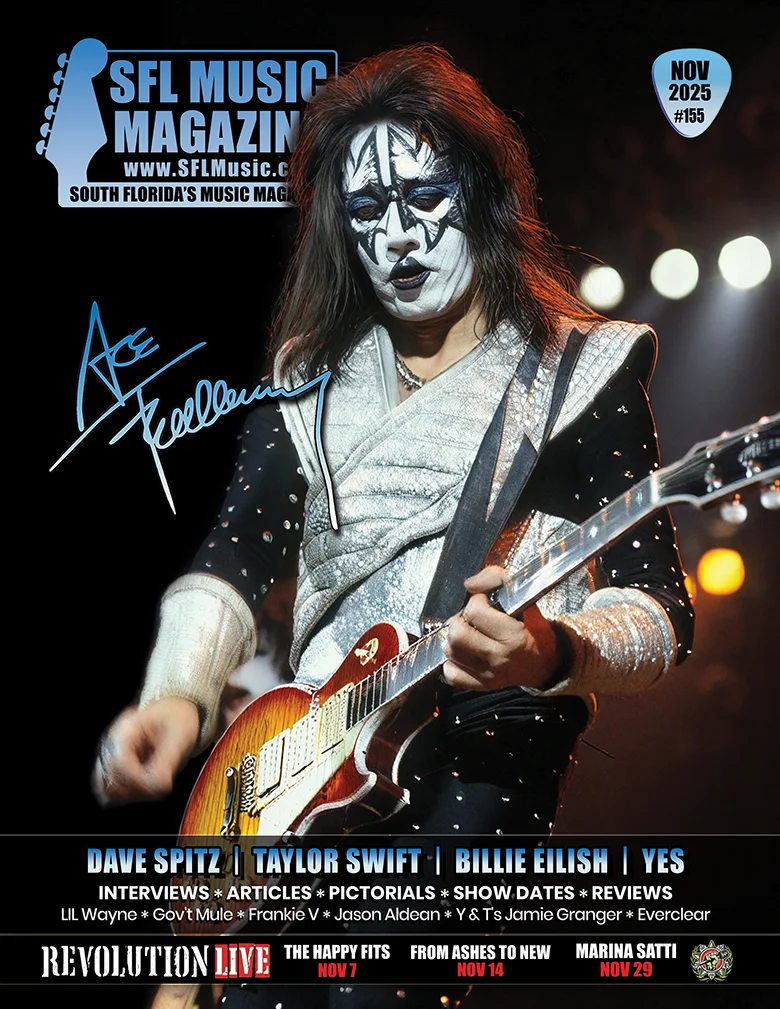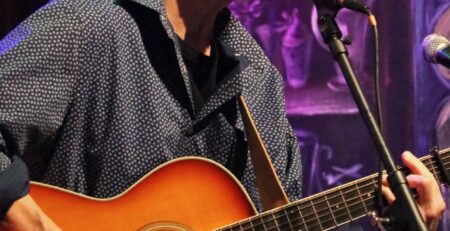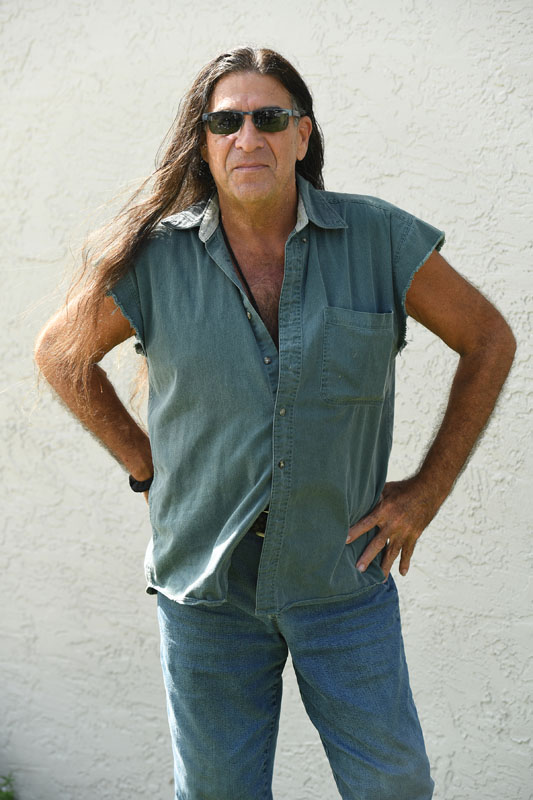
Dave “The Beast” Spitz
By: Lori Smerilson Carson
When you have the ability to wow the world with your vast musical experience of being a bandmate in Black Sabbath, White Lion and Great White displaying your mesmerizing style of playing the bass guitar, you can only be Dave “The Beast” Spitz. Originally hailing from New York, he moved to Florida in the ‘90s to establish a law career, but has ultimately also made his mark in the South Florida music scene, as well as maintaining his world renown status as an outstanding musician. Now, Spitz is lending his talents and knowledge to the Rock ‘N’ Soul band camp that is coming to the Fort Lauderdale and the Miami area (the Doubletree by Hilton in Miami) on December 4th through the 7th.
Catching up with Spitz prior to the camp, he revealed some details about his counseling plans, his past experiences, and what campers can look forward to.
SFL Music Magazine: What are you looking forward to the most as a counselor at the Rock ‘N’ Soul Camp in December?
Dave Spitz: Oh, I’ve done the Fantasy Camp a bunch of times for David Fishof. He’ s a wonderful guy, a genius idea. He’s been doing it, I think over twenty years already. I got involved about five, six years ago and I really enjoy doing because it’s very important to pass the knowledge on to younger people, other bass players and other musicians. So, I’ve always been a big advocate for teaching. I’ve been teaching bass over forty years, on and off. I have instructional videos out. So, it’s a very important thing, these fantasy camps. I think it’s great!
SFL Music Magazine: Your background consists of Black Sabbath, the beginning of White Lion and Great White which you left to go to law school. How do you plan to implement all of this experience into your counseling, including your lawyer experience which is a wonderful asset?
Spitz: Thanks I appreciate it. I’ve always planned on going to law school. Both my parents are professionals. My dad was an attorney in New York City. My mother was a teacher for many years. I always had a love for the law. That’s kind of what keeps our civilization working. Without that, we’re like cavemen. So, I always had an interest in the law and it was always my plan to go to law school, but I’ve been doing music since I was, second or third grade. I was a clarinet soloist way before I started playing bass. So, my parents recognized my musical talent at a very young age, but they always pressed upon me how important education is. I went all the way through college. I mean, I’ve been playing in bands even way before that, so it has to be a balance between music and something else because there’s no guarantees in the entertainment business. As far as going to law school, I eventually went to law school after Sabbath. I lived in L.A. for I think about eight years and then it just came time.
It was like, if I’m going to do it, it’s time for me to do it now. Then I came here to Florida and started law school in ‘96 through ‘99. I’ve been practicing over twenty-five years now. So, in regards to your question teaching and counseling at the fantasy camp, I bring a lot of worldly experience besides musical knowledge. Other types of knowledge as well like from law school, how to talk to people. I’m a natural performer. Besides just a musical artist, I did many, many law trials and stuff over the years. So, I think that gives me a little bit different perspective than maybe someone who’s just a musician. Lawyers are problem solvers. That’s what we’re supposed to be doing and that’s what I do. So, when I turn that part of my “beastialness” towards the camp and music, a lot of musicians are really good musicians, but they don’t pay enough attention to the importance of timing. Because remember, music is something that occurs in time. There’s a start, there’s a middle, there’s an end. The clock ticking at a certain tempo. It’s something that occurs in the universe in time every song that you do. So, what I’m teaching, especially at the camp, I’m always trying to impress upon the students how important timing is and obviously, when you’re bass, bass and drums have to be locked in totally together, and then the guitars and the rhythms. It’s really all about creating rhythm and understanding how important timing is to music because you could be a guy that could play really fast guitar or drums a million miles an hour. If you’re not keeping time correctly, people will just sense that and they will walk away. So, the most important thing is timing and creating rhythm whatever instrument is that you’re playing.
SFL Music Magazine: So, what would you like the campers to take away from what you have to offer, to teach them?
Spitz: Well, each student, each camper is an individual, so you try to give as much attention to people individually as you can, but it’s more like a group thing. Each camper is placed in a different group with each of the teaching counselors. So, you have four or five, however many people he puts in your group. They play their different instruments and they’re given a list of songs to learn based on the bigger artists that are a part of the fantasy camp. So, you don’t have a real lot of individual one on one, but I get it in there as much as I can. It’s more about creating a comradery between the campers in a band type situation. I mean, we try to get as much individual time as we can. It really depends on the people that are assigned to your group and how well everybody’s working together. Hopefully, they get along well. I’m there to make sure everybody does get along and understand what we’re trying to do, and learn the songs. Mainly, you’re learning, but you’re there to have fun and have a good time too, and learn from each counselor's musical and worldly experience. A lot of times campers will ask me stuff about the music business and different aspects of the business. I try to give them as much of my personal insight and experience that I can because remember, it's a different world these days too, the way the music business works. So, it's a little bit different than it was back in the ‘80s, back in the day when they were signing a lot of metal bands and stuff. It’s very different now. You have to be much more self motivated, internet savvy, you know, Facebook and all these other platforms. That’s how people try to launch their musical ideas and careers and bands these days.
SFL Music Magazine: Is that what you would recommend to a new band?
Spitz: Absolutely! You don’t have any choice. That’s how the business works. It’s not like back in the day, there were so many labels. I mean, there’s still smaller labels. Some here in the States, more overseas, but it’s not like they give you a hundred thousand dollars, three hundred thousand dollars to sign. They don’t do that anymore. It’s pretty much nonexistent. So, you have to do most of that background and leg work and promotion on your own. A lot of it’s really luck and timing. You’ve got to get yourself out there on these platforms, and then if something clicks and people start clicking on your stuff, that’s how you get a buzz going and the word starts spreading. It’s a pretty rough game these days for sure.
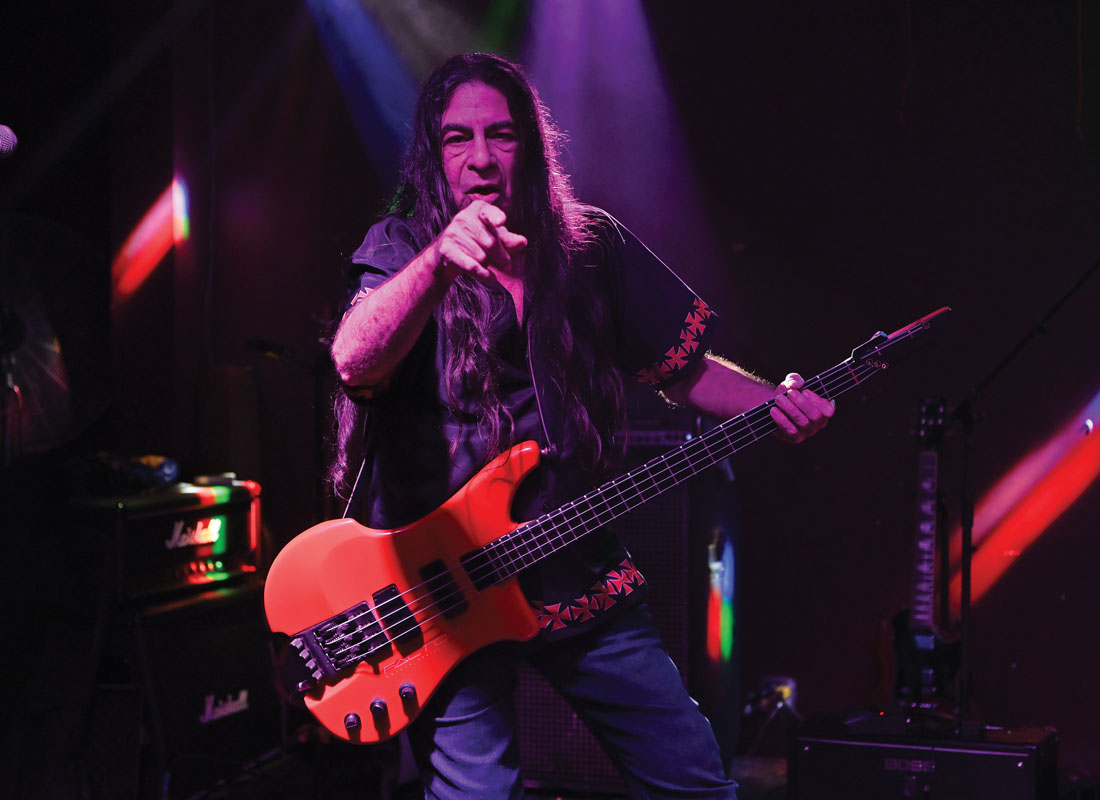
SFL Music Magazine: What would you say prompted you to become a musician, to play the bass? You said you started on the clarinet. Did your parents encourage you?
Spitz: Well, my parents were both music lovers. My mother played a little piano but nothing really to speak of. They were just real music lovers and I just got that gene from maybe genetically something before them (he laughed). I’m not sure exactly,
but like I said, they noticed my musical ability from a very young age. Then when I was pretty young, I had a guy, his name was Steve Weiss. We used to call him Pee Wee and he used to babysit for me, and he was into rock and roll. He was maybe seven, eight years older than me, so he kind of turned me on to a lot of stuff at a very young age. Cream, (Jimi) Hendrix, (Frank) Zappa, The Who, (Led) Zeppelin. Going way back to even some of the sixties bands, (The) Beatles and (The Rolling) Stones and stuff like that. I was kind of exposed to a lot of that heavier music and generationally changing music at a very young age. So, I became really interested. Then a guy that lived right in my development up in New York, guy name Jay Reilly, he lived a couple doors down from me and he played guitar, and we got to be friends. At that point, I became really, really into Cream. Cream was really my favorite band in the very early days. I really wanted to be like Jack Bruce, the bass player of Cream. My dad brought me like a cheap six-string acoustic guitar. I took about five or six lessons at a local music store, but I really wanted to play bass. So, I kept bugging my dad and eventually, he surprised me and brought me the electric bass home, and then I pretty much just taught myself. So, I started when I was probably like, I don’t know ten, eleven, twelve maybe. I don’t remember exactly, but that's how it kind of all started after the clarinet. Well, with clarinet, I had a lot of classical training, so that’s how my family recognized my talent. Then that kind of just transferred into bass, and then other instruments as well.
SFL Music Magazine: With Black Sabbath you recorded Seventh Star, you recorded a couple of albums with Great White, started off with White Lion and their debut record. What would you say attributes to your success and longevity?
Spitz: Good question. I think it’s not just your talent. You have to be able to get along and play well with other guys in the band and be a good person. Have your stuff together. You can’t get involved in drugs. That’s ruined so many people’s lives and careers. You’ve got to be real smart about that. That doesn’t mean that you can’t have a good time and party, but you do everything in moderation. I think the main thing is just being a good person, understanding how to play with other people. You want to make other people want to play with you. Whether they heard about you or you meet them along the way or whatever because that’s what makes great bands, people that get along well together musically and socially and stuff. The comradery and what I call the chemistry, the musical chemistry, that’s really what people are attracted to besides just a riff or a song or a groove. When people go to see live bands, they want to be entertained. So, you have to learn how to not just play your instrument, you’ve got to be a performer. You’ve got to be an entertainer. You’ve got to bring something special to the stage. There’s plenty of people out there that can play amazing, but they’re just kind of boring to watch. I mean, everybody does their own thing, but I think that’s a big part of it, learning how to be a great stage performer. Besides those points, the hardest thing really is to be able to develop your own style of playing. Now, we all learn from all the people that we grew up listening to. Your idols or your favorite bands. Your favorite bass players, whatever. You have to learn from the people that came before you. Then you kind of steal stuff from everybody and you got to make it your own. That’s what the hardest part is. Trying to develop your own style of playing the instrument and performing live. I've been doing that for over forty years already, really developing “The Beast” style. It’s not an ego thing at all. I’m not boasting. It’s just like I said, that’s the hardest thing to really accomplish is developing your own style so that people can recognize your sound, your ability and your performance. When people come to see me play, they’re like “wow, I never saw anybody play that way!” And that’s the most rewarding thing. I’m doing it for so many years that people recognize that.
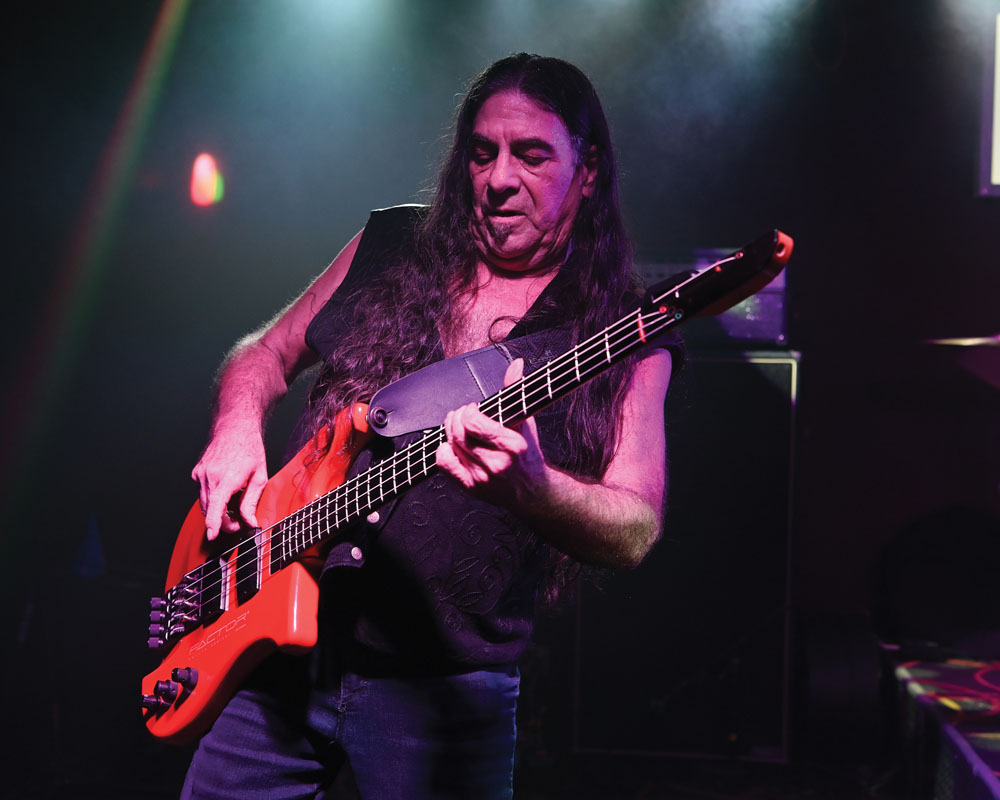
SFL Music Magazine: Our Debbie Brautman wrote about that in her review article of one of your performances. Speaking of comradery of the musicians and the whole scene in South Florida, what do you like about living here and the Florida music scene?
Spitz: I love Florida! That’s one of the main reasons that I decided to come to law school and settle down here after all the world traveling I did with all the big bands and stuff because my family used to come here. We’ve been coming here since I was very young and I’ve always loved Florida. I love the climate down here. I’ve been here a long time. I’ve been here since ‘96. Almost thirty years already. Besides law school and then since then, I’ve just met so many nice people and great musicians that are down here. So, I’m pretty close and friends with a lot of the guys in the local music scene like you were saying. There’s a real lot of competition down here now. Probably hundreds of local bands and really only a small handful of places to play. So, there is a lot of competition. The bands don’t really make any money down here. I mean, if you’re playing out in a cover band, you’re basically doing it because you love music and you love the people that you’re playing with. It’s not something that’s financially sound. It’s different if you get a call to go out on a tour with a bigger band which I do once in a while, but as far as the local guys that I play with, they’re just great people and I play with them because I like the comradely that we develop playing with each other, and just bringing music to the people. Having a good time even though it's at some of these smaller clubs and smaller venues. I don’t know if Florida is that much different from any other cities like that, but I imagine it’s probably similar than different places that you go around the country, but it’s wonderful because there are so many great musicians down here. My new band is called Pegasus with a lot of fantastic local guys that I love playing with. I have a couple of really big things cooking too. Some all-star things that I’m working on, but I can’t really talk about it yet.
SFL Music Magazine: What else do you want the campers to know to be prepared and look forward to with this camp?
Spitz: Well, if you’re signing up for the camp, then you want to come and have fun. Learn the songs that David Fishof and the managers, Britt Lightning pretty much runs the day stuff there, so when they send you the emails and the letters and stuff about how to be prepared, they’ve done this for many, many years. Just pay close attention to what’s in the paperwork. Learn the songs as best as you can and be prepared. Come with an open mind because you’re going to be meeting people that you never met before, you never played with them before, and that’s the exciting part of the camp. Besides meeting some of the rock stars and the camp counselors, when they place you in the band, you’re going to meet all those people and be playing with them, and you’re going to meet all the other musicians that are in the other little bands and stuff. So, it’s a really exciting intellectually kind of rewarding, and musically rewarding experience for each of the campers. Mainly, come prepared, learn the songs, make sure you have your guitar together or whatever your instrument is, and just come with a fresh open mind to meet people and have a great time! Everybody's always nice to the campers. They’re there to have a good time. They like to hear stories. Sometimes someone will corner you and ask you, “what was it like playing in Black Sabbath and all these other bands?” So, you try to give them some cool stories. It’s a lot of fun. It’s four days of non-stop music and rehearsing, and then the last two nights they do the performances. So, it’s really exciting when the campers sign up for this and then they show up. Look, there’s plenty of people at the camps that I’ve done that have come back several times. They do it several times, so I might even meet people there that I’ve met at some of the other camps, but there’s always a lot of new people too. You try to guide them along. As one of the teaching counselors, we try to guide them the best way to maximize their time and really have a good time, and come away with a really rewarding experience from the whole situation.
SFL Music Magazine: From what I saw at the last camp, it’s cool to see everyone interact, and the talent is amazing!
Spitz: That’s the other thing. Some of the people, the campers that sign up, maybe they play in bands at home. Some of them do, some of them don’t. They come from all over the world. All over the states, and people come in from other parts of the world to sign up for these events. So, it's a really exciting experience for people to come and meet the rock stars and the counselors and all the other people that are here that sign up to enjoy the whole experience. It really is a very rewarding experience for everybody involved. That’s why I enjoy doing it. I love teaching. It's important like I said earlier. It’s important to pass your experience and your insight and your knowledge along to the campers because when they sign up, they’re paying a lot of money for this and they really want to get something like a lifetime memory from the experience. So, as a counselor, it’s my job to make sure that they get that. This is going to be a special camp because Stet Howland and I go back over thirty-five years. We’ve played in quite a few bands together including Chris Impellitteri, another band called Slam Nation, and another band called Purple Heart with a great Japanese guitar player named Kuni. That’s just a few to mention, so this is going to be a special camp because Stet’s going to have his group. He’s a counselor and you’ll get a chance for both of us to be participating in the same camp. Stet is like one of the greatest drummers in the world! This is special opportunity. If you haven’t signed up yet, now is the time to sign up for this camp because to have me and Stet, and all these other great players and musicians at this same camp is a really, really special opportunity.

